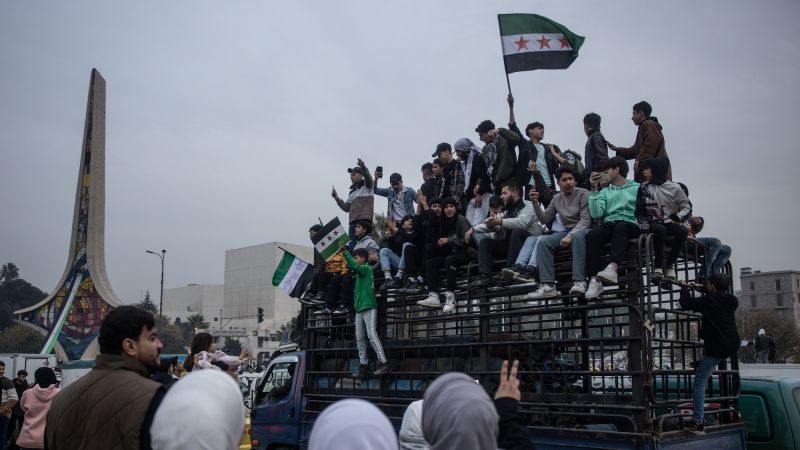
Analysis: Assad exhibited little of the tackiness of Iraq’s Saddam, but his rule was just as brutal Slender shoulders, a limp handshake and soft-spoken lisp. Those were the most vivid memories from my meeting with Bashar al-Assad. It was 2007 and the insurgency against US troops was raging next door in Iraq.
Toppled Iraqi leader Saddam Hussein, a fellow secular Baathist like Assad, had been executed just six months earlier. But Syria’s then leader, who had succeeded his father Hafez seven years before, represented a stable contrast to the chaos engulfing neighboring Iraq. Assad met us without a large entourage, folding his long body into a chair at the head of the room.

At no stage were we physically searched. His security team displayed absolute confidence, by staying mostly invisible. The assumption was that the much-feared Syrian security services had eyes on us from the moment we landed in Damascus, while probably also searching our rooms and listening to us.
Little did I know then that this tall, thin man dressed in a suit would one day be the fiercest opponent of the Arab Spring, surviving where other regional strongmen fell by unleashing a ruthless crackdown that plunged his country into 13 years of civil war, only to then see his dynastic rule collapse in a matter of days. Read more about Ivan Watson’s meeting with the dictator. Competing interests are jostling for position in Syria after Assad's fall.
Catch up here Four days after the fall of dictator Bashar al-Assad, US officials are scrambling to prevent ISIS from regrouping in Syria , as dozens of competing factions vie for control in different parts of the country. But the United States’ most important partner there, the Syrian Democratic Forces (SDF), is under relentless attack from Turkey-backed fighters – raising concerns about the security of detention facilities holding suspected ISIS members and their families in northern Syria. Meanwhile, Israel has been striking military sites across Syria for days, hitting the country’s strategic weapons in bombings that an Israeli official said were intended to prevent the stockpiles from falling “into the hands of extremists.
” Here’s the latest. Torture reckoning: Syrian rebels will not pardon those involved in torturing prisoners under the Assad regime, rebel leader Mohammad al-Jolani said. The head of main rebel group HTS also said his team is working with international organizations to secure possible chemical weapons sites , according to a statement shared with Reuters.
Power transition: The former ruling Baath Party, which was led by the Assad family for decades, said it would suspend its work until further notice. Property, funds and weapons held by the party would be handed to the Syrian government, it added. Israeli attacks: Israel said it struck Syria nearly 500 times in just two days and confiscated Syrian tanks along the buffer zone that separates the Israeli-occupied Golan Heights from the rest of Syria.
Regional powers, including Saudi Arabia and Iran, have accused Israel of taking advantage of the turmoil in Syria to grab more land, while the UN said Israel’s expansion in the Golan Heights violated a 1974 agreement. Turkey strikes: A Turkish drone destroyed military equipment in northern Syria that had been seized by a Kurdish group, Turkish state media said. Ankara-backed factions have clashed with Kurdish fighters in several locations in recent days.
Displaced masses: Tens of thousands of people who fled to Kurdish-controlled northeast Syria are facing “dire conditions” due to a lack of shelter and necessities, Human Rights Watch said. One Yazidi woman told the organization she saw “two pregnant women give birth without any medical care.” Friendly fire: The US-backed SDF accidentally shot down an American MQ-9 Reaper drone over northern Syria after misidentifying it as Turkish, officials said, in an incident that underscores the chaotic nature of fighting in the region.
Blinken trip: US Secretary of State Antony Blinken is traveling to Jordan and Turkey for talks about Syria, and will likely raise the attacks by Turkish-backed groups against the US-supported Kurds. Blinken said he is “not confident” that Jolani will keep his word about protecting minorities in Syria. Desperate search: Although thousands of prisoners have been freed after Assad’s fall, many families are searching for missing loved ones believed to have been held in secret prisons synonymous with torture and murder – with some turning to social media for help.
Drug video: Social media video allegedly shows a warehouse in Syria stacked with captagon , an illicit drug that transformed the country into a narco-state under Assad’s rule. Captagon has become a significant social problem in neighboring Arab nations. US scrambles to quell ISIS resurgence in Syria after fall of Assad The US’ key anti-ISIS partners in Syria said on Wednesday that detention facilities they guard are coming under attack and they have been forced to halt operations against the extremists, complicating the US military’s efforts to prevent the terror group from reconstituting following the ouster of Syrian President Bashar al-Assad .
US officials have been scrambling to ensure the terrorists can’t regroup in Syria and have carried out dozens of airstrikes on ISIS targets in recent days, as dozens of competing factions, including some backed by Turkey, now vie for control in different parts of the country. But the US’ most important partner there, the SDF, has come under relentless attack by Turkish-backed militants in recent days, raising concerns among US officials and experts about the security of the more than 20 detention facilities and camps holding suspected ISIS members and their families in northern Syria. The SDF is largely made up of Kurdish fighters from a group known as the Peoples’ Protection Units (YPG), which is considered a terrorist organization by neighboring Turkey.
The SDF’s top commander in Syria, Gen. Mazloum Abdi, told CNN on Wednesday that the SDF has had to begin relocating ISIS detainees because the prisons have been threatened. Read more about the complex situation in Syria.
Syria's former ruling party suspends work Syria’s former ruling Baath Party said it is suspending its work and activities until further notice, according to a statement published on its media outlet Wednesday. The party, which was led by the Assad family for decades, said all its property, funds and weapons are to be handed to Syrian government bodies. “Vehicles and weapons that were in the possession of the comrades are to be handed to the Ministry of Interior or the nearest police unit or station,” the statement said.
“All the party’s property and funds will be placed under the supervision of the Ministry of Finance and the Ministry of Justice, and its proceeds are to be deposited in the Central Syrian Bank.” The decision comes days after former Syrian President Bashar al-Assad fled the country following a lightning offensive by rebel forces. Assad became Syria’s leader in 2000 in an unopposed election following the death of his father, Hafez al-Assad, who had led the Baath Party since seizing power in 1970.
Syrian rebels are working to secure potential chemical weapon sites, leader says Syrian rebels are working with international organizations to secure possible chemical weapons sites, according to a statement from leader Abu Mohammad al-Jolani shared with Reuters on Wednesday. Jolani, whose real name is Ahmad Al Sharaa, also said he will shut down the notorious regime-era prisons and work to get rid of the security services affiliated with the former Assad regime . Pentagon spokesperson Sabrina Singh welcomed Jolani’s assurances about the potential chemical weapons sites during a press briefing.
“We welcome this type of rhetoric, but actions have to meet words, as well,” Singh told reporters Wednesday, adding, “Our focus is that these chemical weapons do not fall into the wrong hands.” Last week, the United Nations said Syria’s purported destruction of its chemical weapons couldn’t be verified, and on Monday, Israel said it struck Syria’s chemical weapons capabilities. The US on Monday said it has “good fidelity” on where chemical weapons may be located within Syria and is working with its partners to destroy them.
Secret stockpile: Former President Bashar al-Assad agreed, under threat of US intervention, pledged to give up Syria’s chemical weapons, which he had used on his own people during the Syrian civil war. But the US and others believed he retained a secret stockpile, with the regime accused of additional chemical attacks in the following years. Blinken "not confident" rebel group HTS will protect minorities in Syria US Secretary of State Antony Blinken said he is “not confident” that Mohammad al-Jolani, the leader of the Syrian rebel group Hayat Tahrir al-Sham (HTS), will keep his word about protecting minorities in Syria.
“I’m encouraged by the fact that they’ve said the right thing, but what we have to focus on is whether they do the right thing, including protecting minorities,” Blinken said at a House Foreign Affairs Committee hearing about the US withdrawal from Afghanistan. Blinken was responding to a question by GOP Rep. Keith Self, who asked specifically if the top US diplomat was confident HTS would protect Christians and Muslim women in Syria.
A State Department spokesperson said on Tuesday that the US would judge HTS and Jolani “not by those words but by their actions over the coming days, the coming weeks, the coming months.” Self also asked Blinken if he expected Syria would “descend into a terrorist enclave,” to which Blinken answered that the US needs “to do everything possible to avoid that” in the coming days and weeks. Blinken left the hearing to embark on a trip to Jordan and Turkey to coordinate on Syria after the fall of Bashar al-Assad’s dictatorship.
Syrian military aircraft struck as Israel seizes tanks and weapons At least 15 military aircraft have been targeted in a spate of airstrikes at a Syrian air base, according to CNN analysis of satellite imagery obtained from Planet Labs. The strikes also appear to have targeted base infrastructure. In recent days, the Israeli military has engaged in a concerted effort to destroy Syrian military assets, striking air bases, ports, and weapons stockpiles across the country, with the intention of preventing them falling into an adversary’s hands.
The Marj Ruhayyil Airbase, located 18 miles (30 km) south of Damascus, appears to have housed a unit of Mi-25 “Hind” helicopters,” seen in satellite imagery collected by Planet Labs on December 3 and Maxar imagery from earlier this year. Tanks seized: Meanwhile, the Israeli military said it confiscated several Syrian tanks along the buffer zone that separates the Israeli-occupied Golan Heights from the rest of Syria. Israeli troops also said they located a Syrian observation post in the Mount Hermon region within the buffer zone and seized a cache of weapons including missiles, explosives and other equipment.
Israeli Prime Minister Benjamin Netanyahu ordered the military seize the buffer zone and other positions near it. Israel insists it is conducting “defensive missions” and eliminating threats to its citizens in the area. Videos point to Assad regime's involvement in drug trafficking Social media video surfaced Wednesday allegedly showing a warehouse in Syria stacked with captagon, an illicit drug that had transformed the country into a narco-state under former President Bashar al-Assad’s rule.
The large warehouse was reportedly located at the headquarters of a military division near Damascus that was commanded by Assad’s brother Maher. CNN is unable immediately to verify the location. A voice commenting over the video says it is “one of the largest warehouse facilities of captagon manufacturing of pills.
” Piles of pills are seen on the floor along with drug-making equipment. If confirmed, the discovery would support claims by the United States and others that the Assad regime had been involved in actively exporting the drug. Captagon has become a significant social problem in neighboring Arab nations and spurred some of them to engage in talks with the former Syrian regime to curb its trafficking.
What is captagon? The highly addictive drug, mostly containing amphetamine, is sometimes described as the “poor man’s cocaine.” Studies over recent years have estimated the annual trade in the drug to be worth billions of dollars. It is believed to have become an economic lifeline for the Assad regime while it was under crippling US sanctions.
Read more about the impact of captagon in the Middle East. Thousands of regime prisoners are free, but many Syrians are still searching for loved ones Desperate Syrians are turning to social media for help as they search for their missing loved ones believed to have been held by the Assad regime in secret prisons synonymous with torture and murder. Thousands of prisoners have already been freed from notorious regime jails after rebels toppled longtime dictator Bashar al-Assad, who fled to Russia.
But for many families, the search goes on. At least 200,000 Syrians are missing, most of whom were kidnapped or detained by the Assad regime or its affiliates, according to the Syrian Civil Defense, known as the White Helmets. The group has urged Moscow to pressure Assad to reveal the locations of secret prisons.
“Hassan Muhammad ...
Date of arrest 2018. If you know any information, you can communicate directly with the family through the comments,” said one post on a Facebook page for families of the missing. A Syrian woman searching for her detained husband said government forces told her he had died, but his body was never given to her.
“There were no words to describe how I was feeling,” Umm Firas told CNN. “I was holding on to the hope he would be released, and our family would be reunited.”.















